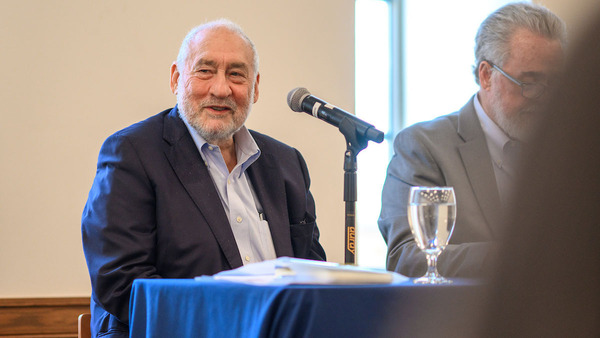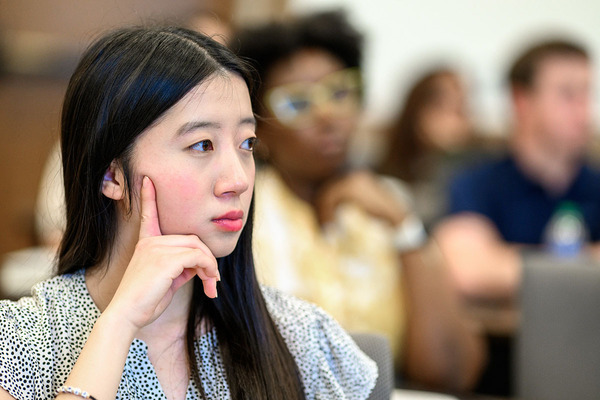Nobel laureate Joseph Stiglitz addresses inequality with a people-centered economy

Inequality is a policy choice — not an inevitable outcome — and can be addressed through economic approaches that prioritize human dignity, economist and Nobel laureate Joseph E. Stiglitz said during a recent visit to the University of Notre Dame’s Keough School of Global Affairs.
Stiglitz, a Columbia University professor and former chief economist at the World Bank, met with faculty and students as well as Keough School and Notre Dame leadership during his April 15 visit to campus, during which he delivered the inaugural Joseph E. Stiglitz Lecture on Inequality and the Good Society.
The new lecture series, made possible with support from the Ford Foundation, was organized by Ray Offenheiser, director of the Keough School’s McKenna Center for Human Development and Global Business. The series is dedicated to bringing outstanding scholars to Notre Dame to share groundbreaking scholarship and policy insights on inequality and is a part of larger strategic efforts by the school and the University to address global poverty.
Watch a discussion between Joseph Stiglitz and Ray Offenheiser on global inequality here.
Rules create structural inequality
During his public remarks, Stiglitz outlined the ways inequality is written into the rules of the U.S. and global economies by powerful interests that prioritize profit.
“Markets don’t exist in a vacuum,” Stiglitz said. “We structure our market with rules and regulations. Rules matter for creating inequality. [In the United States], we’ve frankly made a choice to have more inequality than other countries.”
In the United States, some 40 years of neoliberal — or free-market-oriented — economic policies have bolstered corporations and lowered the living standards of everyday people, Stiglitz said. In particular, rules have weakened antitrust protections and permitted monopolies; weakened worker bargaining power, ensuring that wages haven’t kept pace with profits; crafted bankruptcy laws that favor companies while forcing bankrupt consumers to repay student loans; and allowed corporations to pay low taxes while enjoying massive profits.

As a result, Stliglitz said, the United States has less economic mobility than peer countries — meaning that for U.S. residents, life outcomes are more dependent on their parents’ income and education levels than they are for people in other wealthy countries.
These regressive policy choices are reinforced by the United States’ political system, Stiglitz said, where Supreme Court decisions like Citizens United have given corporations more power to make political donations and shape the rules in their favor. And inequality remains a problem globally as well, he said: Multinational corporations lobby to keep their tax rates low, and the international debt architecture favors wealthy creditors over cash-strapped countries that slash public spending in order to afford high debt payments.
Ultimately, the inequality created by these systems and structures threatens the future of democracy, Stiglitz said, adding that widespread dissatisfaction leaves voters vulnerable to demagogues who mislead the public and discard democratic norms.
Prioritizing human dignity: Policy and practice
While Stiglitz was unsparing in his critique of the status quo, he also expressed optimism that voters and policymakers could make different choices and reframe how they think about and discuss the concept of freedom. He urged audience members to think of freedom not as fewer government regulations but rather as the opportunity for everyday people to live a good life.
“Freedom should be about human dignity and human flourishing,” Stiglitz said.
Such an approach — one that prioritizes the needs of marginalized people and communities — made Stiglitz a natural fit to inaugurate the Keough School’s new inequality lecture series, said Scott Appleby, the Marilyn Keough Dean of the Keough School.
“Confronting inequality can make us uncomfortable because it may challenge us personally to face some hard facts about our economic system and who it benefits at the expense of others,” Appleby said.
“But such moral and intellectual discomfort may be just the challenge we all need. Indeed, commitment to human dignity and intellectual development challenges us to examine those social structures and systems that explain and sustain the marginalization of the poor, and to pursue policies and practices that would create a more equitable and just world.”
Watch the full lecture here.
Originally published by Josh Stowe at keough.nd.edu on April 22.
Contact: Tracy DeStazio, associate director of media relations, 574-631-9958 or tdestazi@nd.edu
Latest International
- Vatican honors Martin and Carmel Naughton with papal awardThe late Pope Francis, in one of his last acts, conferred the honour of the Order of Saint Gregory the Great upon Carmel and Martin Naughton, Trustee Emeritus of the University of Notre Dame. The papal honor is in recognition of the Naughtons’ outstanding philanthropy in the areas of education and the arts, particularly in the provision of philanthropic support and scholarships to Catholic education at the University of Notre Dame and Kylemore Abbey, and in their transformative contributions to higher education in Ireland.
- Prioritizing prenatal care may decrease low birth weight outcomes in The Gambia, Notre Dame research findsA new study co-authored by University of Notre Dame researchers highlights the importance of prenatal care for improving the health of mothers and newborns, providing evidence that can inform policy.
- Navigating the waters of peace: Researchers address challenges, opportunities in implementation of Colombia's Peace AgreementNearly half of the commitments outlined in Colombia's historic peace accord face significant challenges and may not happen in time unless policymakers make several key interventions, warns a new report from Notre Dame's Peace Accords Matrix. The report offers a blueprint to salvage an accord that has lagged behind its implementation deadlines, putting its legacy at risk. It highlights timely fixes that can strengthen the agreement.
- Partial peace deals may facilitate comprehensive accords, offering roadmap for policymakers, practitionersPartial peace agreements — deals that address targeted issues on the way to larger comprehensive accords — could provide a blueprint for peacebuilding policymakers and practitioners, according to new University of Notre Dame research.
- CANCELED: University to host Cardinal Pedro Barreto of Peru and Cardinal Peter Turkson of Ghana as part of Notre Dame ForumAs part of the 2024-25 Notre Dame Forum, Cardinal Pedro Ricardo Barreto Jimeno, S.J., of Peru and Cardinal Peter Kodwo Appiah Turkson of Ghana will visit the University of Notre Dame to participate in a conversation with President Rev. Robert A. Dowd, C.S.C., at 11:30 a.m. April 25 in the Smith Ballroom of the Morris Inn. The conversation is open to the public and will also be livestreamed for both Spanish-speaking and English-speaking audiences.
- ‘Who the messenger is matters’: Cultural leaders can positively influence population growthFertility rates across the world have been steadily dropping since 1950. Pinpointing the reasons is at the heart of Lakshmi Iyer's work as a professor of economics and global affairs. Her research exemplifies the kind of population-level research that Notre Dame Population Analytics (ND Pop), a new research initiative at the University, seeks to foster.













